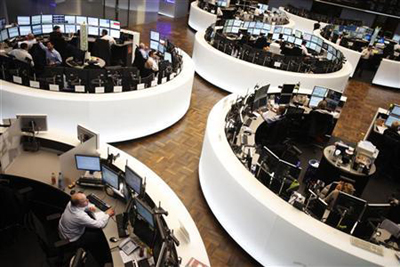Thursday, 03 September 2015 01:15
 LONDON: Global stock markets faced renewed volatility Wednesday, as further evidence of slowing growth in China caused investors to question the prospects for continued global economic expansion.
LONDON: Global stock markets faced renewed volatility Wednesday, as further evidence of slowing growth in China caused investors to question the prospects for continued global economic expansion.
Despite revived jitters that sent most markets veering from losses to gains, however, most indices managed to finish up after serious slides on Tuesday.
Following hefty early losses, many Asian bourses reversed direction to close in positive territory — the latest session of roller-coaster activity.
At the end of trade in Europe, London, Paris and Frankfurt similarly finished higher after see-sawing earlier in the day.
Wall Street was mixed in the middle of the trading session, as investors sought to rebound from nearly three percent losses Tuesday.
The Australian dollar — heavily linked to demand for the country’s abundant natural resources — plumbed six-year lows as figures showed the economy logged a slower-than-expected 0.2 percent quarterly expansion.
That came after Canada officially entered recession, hit hard by stubbornly low oil prices.
Both countries’ economies are dependent on the exports of commodities — such as iron ore — that have powered Chinese growth over the past decade.
Adding to tensions are uncertainties about whether the US Federal Reserve will raise interest rates at a policy meeting this month.
“You have worries about the global growth outlook, led by Chinese concerns at a time when the Fed is thinking about raising interest rates, and that’s leaving investors very twitchy,” Shane Oliver, a global strategist at AMP Capital Investors Ltd. in Sydney, told Bloomberg News.
“I think we’ve seen the worst, but it’s an environment where volatility is likely to continue.”
Tokyo saw some of the worst turbulence, opening sharply lower only to rally at mid-session and then close down 0.39 percent.
Shanghai plunged 4.39 percent at the beginning of the day, jumped into positivity by lunch but ended 0.20 percent lower. Analysts said the heavy losses were largely erased thanks to government support ahead of a two-day World War II remembrance holiday.
On Tuesday, official data showed Chinese factory activity contracted in August, the latest sign that growth in China — which accounts for more than 13 percent of global GDP — is slowing.
Commentators say China’s high government-spending model of the past three decades is unsustainable.
Washington, whose own recovery from the global financial crisis is still far from entrenched, will this week urge China to communicate its policies better, when representatives from the Group of 20 meet in Turkey.
Treasury Secretary Jacob Lew “will emphasise that, fundamentally, the world needs more demand,” said a US official, who spoke on condition of anonymity.
Wu Kan, a Shanghai-based fund manager at JK Life Insurance Co., said Beijing appeared to have been buying blue-chip stocks in recent days in an effort to support the market.
“But investors have lost confidence amid the ongoing de-leveraging and the overnight global rout,” he said. “The correction isn’t over yet.”
The state-owned China Securities Journal reported Wednesday securities firms were transferring more funds to a government-supported fund to help stabilise the market.
Analysts estimate the government has spent hundreds of billions of dollars to prop up stock prices.
The jitters in China were reflected across most of the region. Hong Kong swung in and out of positive territory throughout the day to end with a loss of 1.18 percent. Seoul ended 0.05 percent higher after starting in the red.
London closed 0.41 percent higher, while Paris ended 0.30 percent up and Frankfurt finished 0.32 percent ahead.
All three suffered frenetic sell-offs Tuesday.
In mid-day trades the Dow Jones Industrial Average was up 0.81 percent, and the Nasdaq Composite gained 1.03 percent. Despite opening higher, however, the S&P 500 was down 2.96 percent.
The euro slid to $ 1.1240 from $ 1.1313 late on Tuesday in New York on building optimism over the health of the US economy.
The current turbulence notwithstanding, International Monetary Fund chief Christine Lagarde on Wednesday said Asian economies were doing “pretty well”.
Speaking in Jakarta, she said the recent turmoil highlighted the “extraordinary gains” made by Asian economies but warned further volatility was on the horizon.
“Now the situation is changing yet again, and we are all feeling the impact of China’s rebalancing and moving to a revised business model,” she told a conference.
Earlier, however, Lagarde acknowledged global economic growth in 2015 would likely be weaker than the 3.3 percent estimate the IMF published just two months ago.


























